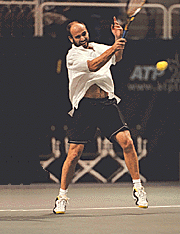|
Features
This ongoing clownishness was frequently interrupted by the sound of his racket crashing into the court following missed shots. Sokolov seemingly ignored the torrent of verbiage, needling, and racket slamming tirades even though he was losing badly. Then things got ugly. On game point at 4-2 in the second set, Sokolov called a ball out that would have given Rudwall a 5-2 lead and put a lock on the match. "Elephant Boy" sees the ball in and trumpets forth his protest. In or out? Who knows, but back-and-forth sniping ensues between the two players over the next games, including charges of intentional hooking on the original disputed call. Quickly Rudwall comes unglued as he continues to carp about the out call and loses the set, 6-4. Match tied: one set apiece. Sokolov is on a roll. But, wait! During the changeover, silent Seth quietly leaves the court and reports to the tournament director's table. "My opponent's behavior is just unacceptable. I'm retiring from the match." Stunned - after all this is a so-called 'friendly' club event - the tournament director offers to monitor the rest of the contest and Seth reluctantly returns to the battleground.
Where's the Official?As the tournament official walks onto the court, it's Rudwall's turn to be stunned. His behavior is being questioned? "What about calling a ball out when it's in?" he asks the newly arrived inspector. Walking over to the scene of the alleged misdeed, Rudwall dramatically points to where he believes the ball landed; fat on the line by his estimation. Sokolov calmly watches with a look that says to the official, "See what I mean?" Play continues with Rudwall unable to get his mind back in the match until eventually he is down three match points at 5-2. Now it's Sokolov's turn to dissemble. Rudwall hangs on to win the match in a tiebreaker. However, in reality, both players lose in a situation like this. In WINNING UGLY: Mental Warfare in Tennis, Brad and I (with later contributions directly from Andre Agassi) focused on mental management rather than stroke production. Reason? No matter how good your stroke production is, when your mind melts down, your strokes do likewise. Knowing how to handle challenging situations is the mark of a champion.
In this match, Rudwall nearly blew an easy victory because he couldn't let go mentally of a call he felt was incorrect. Seth nearly quit the match because he didn't know how to deal with Rudwall's behavior. Lesson(s) to be learned? Anytime you encounter questionable behavior in a tournament (as Sokolov did) the remedy is simple: ask your opponent to stop. If the behavior continues, simply ask for an umpire to intervene. Don't wait until you're completely nuts. If you encounter a call you disagree with (as Rudwall did), ask your opponent if he or she is certain of it. If it happens again, and again, simply ask for an umpire to intervene. It's sweet and simple in both cases. Too often in tournaments griping and grousing by you or your opponent will degrade the quality of your mental management. When that happens - unless you're John McEnroe - you'll usually lose. How do you spell 'relief'? U·M·P·I·R·E. And, of course, it's even easier than that in non-tournament, or 'social', matches. Find a new partner next time.
|
Last Updated 9/1/98. To contact us, please email to: webmaster@tennisone.com TennisONE is a registered trademark of TennisONE and SportsWeb ONE; Copyright 1995. All rights reserved. |
||||||
 Steve Jamison is the co-author of Winning
Ugly: Mental Warfare in Tennis.
Steve Jamison is the co-author of Winning
Ugly: Mental Warfare in Tennis.

